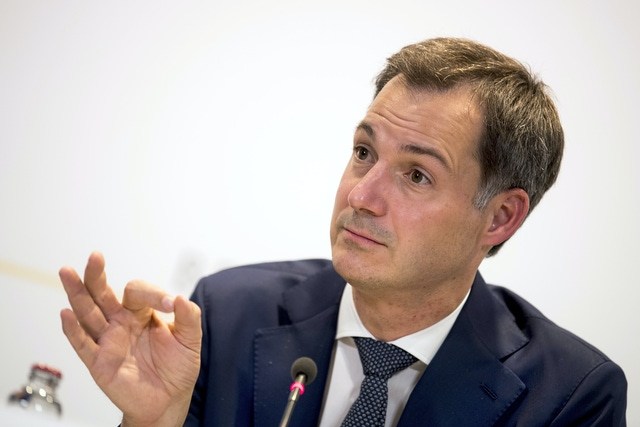At the press conference after the Consultative Committee on Friday, Belgium's Prime Minister Alexander De Croo was particularly sharp for people who choose not to be vaccinated against the coronavirus.
While some relaxations were announced for Flanders, the low(er) vaccination rates in Wallonia and particularly the Brussels-Captial Region mean that the other regions still have to apply stricter rules.
"We see that in certain regions, like Brussels, for example, just half of the population (51%) has been fully vaccinated. That situation is both unacceptable and unsustainable," De Croo said.
While he made it clear that he did not want to criticise the hard work of the health services and commends the efforts they are making, De Croo stressed that where the vaccination rate is not high enough, the figures are not moving in the right direction.
"Today, this is becoming an epidemic of the unvaccinated," he emphasised. "Our intensive care units are becoming a gathering place for non-vaccinated people."
"As a society, we cannot accept this. We cannot accept that people make choices that endanger others. No one has the right to voluntarily put other people at risk," De Croo said. "The vaccines are safe, free and available everywhere."
Related News
- Open debate on mandatory vaccination, Brussels Minister-President says
- 'Tired and angry': ICU nurses at Brussels hospital say spirits have sunk
- Denying freedoms to non-vaccinated people 'certainly' possible, says Belgian Health Minister
- Belgium takes 'another big step' towards freedom from 1 October
Just two days ahead of the Consultative Committee, the nurses of the intensive care unit of the University hospital in Brussels (UZ Brussel) published an open letter detailing that they are "tired and angry" now that the hospital figures are rising again, for the fourth time in one year and a half.
"Currently, those lying here now are all unvaccinated, and that makes us especially angry because this situation could have so easily been avoided," Caroline Robberecht, a UZ Brussel intensive care unit nurse, told The Brussels Times on Wednesday.
"If you had asked me during the second or third wave, we could have said 'look, these people have not been vaccinated, it can’t be their fault', but now we know that everyone has had that chance,” she said.
Robberecht added that nurses find the fact that regular care is being pushed aside again - by people who were given the option to be vaccinated and chose not to be - particularly difficult.
"All people have a right to care, and now the non-vaccinated are taking it away from them. Ultimately, everyone pays the price for people who choose not to be vaccinated," she said.
Additionally, De Croo underlined, those who do not get vaccinated are partly responsible for the fact that stricter measures remain in place in some areas. "Those who do not get vaccinated are putting their own lives and the lives of others at risk."
'Making the horse drink'
Brussels Minister-President Rudi Vervoort, whose region sees the largest number of people who are opting out of vaccination, called for "a debate on what is called freedom."
"The freedom of one person ends where that of another begins," he said. "The freedom not to be vaccinated is preventing others from having a normal life."
On Friday, Vervoort told RTBF that the debate on making vaccination mandatory for everyone should be held without taboos, considering the Capital-Region' low vaccination rate.
According to him, the issue is that many refuse vaccination for a whole range of reasons, from anti-vaxxers to people who are either disinterested, uninformed or afraid of the vaccine.
Referring to the analogy of leading a horse to the water but not being able to make it drink, Vervoort wondered if the horse should be forced, before saying that, according to him, "at some point, it should be."
"It is a question of solidarity and a question of collective interest. We also live in society. In society, that also means that we must do our part to protect each other," he said.
However, both De Croo and Federal Health Minister Frank Vandenbroucke already stated that a debate on compulsory vaccination is purely theoretical, as there are no ways to handle people who refuse.
"We are going for an obligation for people who work in healthcare, but the general obligation is a debate that does not help us," said Vandenbroucke last week. "What do we do with people who do not want it? Throw them in jail, vaccinate them under sedation?"
He repeated his stance at the press conference on Friday, saying that it is an "interesting philosophical debate," but that it does not bring any solutions with it.
"Solidarity is not always easy. The last mile is always the hardest," Vandenbroucke said. "That also applies to the vaccination campaign. It has been said many times that there is still a long way to go."

